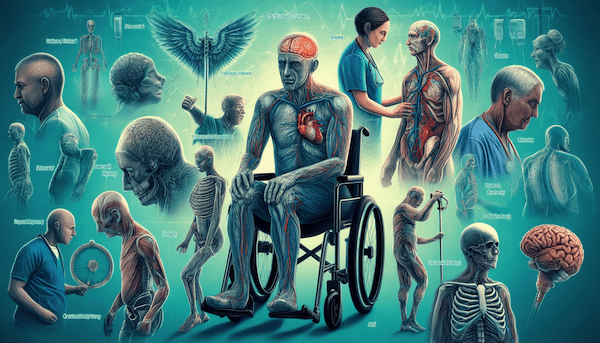Diseases That Cause Severe Disability
When it comes to diseases that lead to severe disability, understanding their impact is crucial. These conditions can drastically alter lives, affecting not just the individuals but also their families. This post explores several diseases known for causing severe disability, focusing on their neurological aspects and how Neurology Mobile Systems Associates and The Neurology Group can help.

Amyotrophic Lateral Sclerosis (ALS)
Amyotrophic Lateral Sclerosis, commonly known as ALS, is a progressive neurodegenerative disease that affects nerve cells in the brain and spinal cord. ALS leads to the gradual loss of muscle control, resulting in severe disability.
What is ALS?
ALS is characterized by the death of motor neurons, which are responsible for voluntary muscle movements. This leads to muscle weakness and atrophy, eventually impacting the ability to speak, eat, move, and breathe. Although the cause of ALS is not fully understood, genetic and environmental factors are believed to play a role.
Symptoms and Progression
Early symptoms of ALS include muscle twitches, cramping, and stiffness. As the disease progresses, these symptoms worsen, leading to significant loss of mobility and independence. Most patients require comprehensive care to manage daily activities.
Multiple Sclerosis (MS)
Multiple Sclerosis is another debilitating condition affecting the central nervous system. MS disrupts the flow of information within the brain and between the brain and body.
Symptoms and Impact
MS symptoms vary widely but often include fatigue, difficulty walking, numbness, and muscle weakness. The disease can also cause vision problems, cognitive issues, and severe disability over time. Treatment focuses on managing symptoms and slowing disease progression.
Stroke
A stroke occurs when blood flow to a part of the brain is interrupted, leading to brain damage. Depending on the severity, a stroke can cause significant disability.
Types of Stroke
There are two main types of stroke: ischemic and hemorrhagic. Ischemic strokes are caused by blockages, while hemorrhagic strokes result from bleeding in the brain. Both types can lead to severe, long-lasting disabilities, including paralysis, speech difficulties, and cognitive impairments.
Rehabilitation and Recovery
Stroke rehabilitation often involves a combination of physical therapy, occupational therapy, and speech therapy. The goal is to help patients regain as much function as possible and adapt to any lasting disabilities.
Parkinson’s Disease
Parkinson’s disease is a progressive neurological disorder that affects movement. It is caused by the loss of dopamine-producing brain cells.
Symptoms and Treatment
Common symptoms include tremors, stiffness, and difficulty with balance and coordination. As the disease progresses, patients may experience severe mobility issues and other complications. While there is no cure, medications and therapies can help manage symptoms.
Epilepsy
Epilepsy is a neurological disorder characterized by recurrent seizures. These seizures are caused by abnormal electrical activity in the brain.
Types of Seizures
Seizures can vary from brief lapses in attention to severe convulsions. The impact on daily life can be profound, leading to injury, cognitive issues, and social stigmatization.
EEG Test
An EEG test (electroencephalogram) is commonly used to diagnose epilepsy. This test records electrical activity in the brain, helping to identify abnormal patterns that may indicate epilepsy.
Traumatic Brain Injury (TBI)
Traumatic brain injury occurs when an external force injures the brain. TBIs can result from falls, car accidents, or sports injuries.
Impact and Rehabilitation
The severity of TBI can range from mild concussions to severe brain damage. Symptoms include headaches, memory problems, and mood changes. Rehabilitation focuses on helping patients regain lost skills and adapt to any permanent impairments.
Brainstem Auditory Evoked Potentials (BAEP)
BAEP is a test used to evaluate the function of the auditory pathways in the brainstem. This test is essential for diagnosing conditions that affect hearing and brain function.
How BAEP Helps
BAEP can detect abnormalities in the brainstem that might not be visible on other tests. It’s particularly useful for diagnosing conditions like multiple sclerosis and brainstem tumors.
Neurology Mobile Systems Associates and The Neurology Group
At Neurology Mobile Systems Associates and The Neurology Group, we are dedicated to providing comprehensive care for patients with severe neurological disabilities. Our team of experts uses advanced diagnostic tools, such as EEG tests and BAEP, to accurately diagnose and manage neurological conditions.
Comprehensive Care and Support
We offer a range of services, including physical therapy, occupational therapy, and speech therapy, to help patients manage their symptoms and improve their quality of life. Our goal is to provide personalized care that addresses the unique needs of each patient.
FAQs
What is ALS?
ALS, or Amyotrophic Lateral Sclerosis, is a progressive neurodegenerative disease that affects nerve cells in the brain and spinal cord, leading to severe muscle weakness and atrophy.
How does an EEG test work?
An EEG test records electrical activity in the brain using small electrodes placed on the scalp. It helps diagnose conditions like epilepsy by detecting abnormal brain activity.
What are the symptoms of multiple sclerosis?
Symptoms of multiple sclerosis include fatigue, difficulty walking, numbness, muscle weakness, vision problems, and cognitive issues.
What is BAEP used for?
BAEP (Brainstem Auditory Evoked Potentials) is used to evaluate the function of the auditory pathways in the brainstem. It helps diagnose conditions affecting hearing and brain function.
How can Neurology Mobile Systems Associates help with neurological disabilities?
Neurology Mobile Systems Associates provides comprehensive care, including diagnostic tests, therapies, and personalized treatment plans to manage and improve the quality of life for patients with neurological disabilities.
Ideas for Future Blog Posts
- The Latest Advances in ALS Research
- How to Support a Loved One with Multiple Sclerosis
- Rehabilitation Techniques After a Stroke
- Managing Daily Life with Parkinson’s Disease
- Understanding and Living with Epilepsy
By addressing these topics, we aim to continue providing valuable information and support to those affected by neurological diseases, helping them navigate their challenges and improve their quality of life.